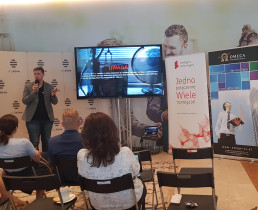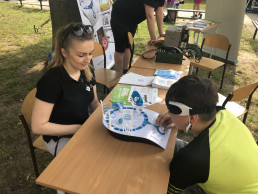How to talk with a child about difficult emotions?
The appearance of the first words is a preview to more effective communication between the child and the parent. Despite language development, effective communication can still pose difficulties for both parties. How to check if your communication with your child is good and effective? It is worth considering the dialogue with the child. Do you use messages, which - though dictated by care - act as communication locks?
The child is excited and the parent is ...
A child who experiences strong emotions, a failure or faces problems can give the impression of needing guidance. Adults often feel obliged to give specific advice, to mobilize ("Nothing happened"), or give an example of good behavior from your own experience ("If I were in your place ..."). Sometimes they can overwhelm a number of questions that your child may not be ready for. Although such reactions are a sign of concern, the child may rebel against them or feel even worse. It may even become convinced that its behavior and perception of the situation does not meet parental expectations.
The sight of a worried and suffering child is not easy to bear - therefore, it is a strong temptation to comfort and divert attention. However, if a child is angry at the teacher, regrets about a lost match or sad after losing a beloved toy, attempts to change the topic can only bring a short-term effect. The child will bypass an important lesson of confrontation with his own emotions. Relief will not bring a consolation attempt ("Everything will be fine"), which does not really solve the problem. Nothing gives a rational explanation of the situation, which, however, does not help to cope with emotions.
The world from a 1 m perspective
The adult's perspective also creates the temptation to judge the situation and behavior of the child - "You will understand when you are older". Sometimes it is easy to forget that perceiving the world through the eyes of someone measuring a little more than 1 meter differs significantly from the look of an adult person - therefore a good dialogue should assume an attempt to adopt the child's perspective and enter into his role for a moment.
Good messagesHow to achieve it? How to replace ineffective messages and complement your relationship with your child for a dialogue based on mindfulness and empathy?First of all, it's worth using techniques related to active listening, which make the interlocutor feel and listen. During the conversation with the child, a good start will be to make eye contact - adjusting the position to the child's growth should facilitate looking in the eye. To see how important it is for the conversation, just sit on the floor and try to lead a serious conversation with someone standing above us. Nobody would feel comfortable. When you can freely look at the other person, a sense of respect and trust is strengthened. Your child will certainly feel engaged when you express interest, following the story - asking about some aspects, asking specific questions and encouraging to develop threads ("How do you think, how did this happen?", "Will you tell me more about this?") .Paraphrase - the queen of careful listeningIt is worth repeating in brief the statement of the child, making sure that it was well understood - "So you say that ..." - this will avoid misunderstandings. An important element of the dialogue with the child is to reflect his feelings - naming emotions that are associated with the experienced situation and an attempt to describe why the child feels in a certain way ("Are you disappointed, because Kasia did not invite you to the party?"). Help in naming feelings will positively influence the development of the child's emotional dictionary, thanks to which it will gradually "tame" your emotions. Such a tool will be especially useful when it will experience strong and sometimes difficult emotions. It will help the child to open himself to further dialogue and can be a great introduction to understanding the behavior of oneself and others - to develop emotional intelligence.Using of the above-mentioned techniques requires from parents a lot of courage and confidence that the child is competent enough to solve their problems and that he has the right to experience all kinds of emotions - also those that seem too difficult for a child's age. However, the reward for the effort is priceless - agreement in relation to the child and mutual openness.
Mindfulness is the most important thing
Messages directed to the child shape its development. What counts is awareness and mindfulness, but it is also worth remembering that, as toxicology says - the dose determines the harmfulness of the substance. So, there are no occasional cases of so-called language of non-acceptance treat as a parental failure. A single situation will not immediately mean that the child will have problems with self-assessment or difficulties at school. However, it is worth carefully analyzing the approach to conversations with the youngest. That this building a good agreement will become a standard of everyday communication. In this way, the conversation will become more satisfying for both sides.
#expertTalk myhive: Cybersecurity - how to talk with your child about "Internet"
It is a pleasure for us to cooperate with myhive. Together with our founder, Intelligent Technologies S.A. and Omega Enterprise Services we conduct #expertTalk for parents of children aged 7-12 years on the subject of children's safety in the Internet.
The first meeting took place on Thursday, June 6 in myhive Brama Zachodnia, next on Tuesday, June 11, in myhive IO-1. The last will take place on Tuesday, July 2 at Crown Point.
Thank you myhive for great organization and the opportunity to meet the parents.
Family Picnic in Dębe Wielkie
On Saturday, June 8, we took part in the Family Picnic organized by the Primary School named Volhynian Cavalry Brigade in Dębe Wielkie. We showed how traditional fixed telephony works. Our guests could independently connect using the local battery and hand-operated telephone. Participants of the Picnic also had the opportunity to check how the biofeedback device works, i.e. the biological feedback that informs about the physiological state of the body under the influence of stimuli. Devices of this type are used, for example, in NASA.
It was a very nice and sunny afternoon. Thank you to the School for the invitation, we wish you all interesting and safe holidays.
Preschooler looking for independence
Inconspicuous milestones
A toddler, who first finds a spoon with his mouth (and by the way smears half of its contents on his face) is not only a charming and funny sight. This is also important information from the child to his parents: "Mom, dad, I'm on the trail of independence!".
Independence from the environment and skills that allow us to realize our passions and face challenges are priceless in the development of every child. However, for the child to enjoy the benefits of independence, it must first learn it. Not necessarily alone.
Parent – model
Parents are not only a source of information, motivation and support – they are also a model that is constantly observed and imitated. Well, when the child sees how parents approach the emerging challenges - they look for the best solution and try to put them into practice, but also know how to ask for help from others.
You can sew a button accompanied by your child, screw in a light bulb or show him how to get the information needed to deal with a problem. If a child has a chance to observe creative strategies of coping with problems, he / she will learn an active attitude to the difficulties encountered. However, to be able to practice new skills, he must have space to experiment.
Largest challenge – nothing to do
For example, when a child decides to take a case into his own hands and willingly takes to peeling mandarins for a family salad, the parent will face a huge challenge to ... do nothing. Although he would certainly like to give valuable tips on how to do the job faster and more neatly. Refraining from interference can, however, bring many benefits - research suggests that the parents of children with a high level of independence are those who do not give too much guidance or do not give away. They react when the safety of the child is endangered, in other words when, for example, a toddler, in order to diversify kitchen adventures, reaches for a steak knife. So, let's leave instructions for another occasion - and let spontaneous activity be a field for self-discovery of your abilities.
Effective praise
Nothing, however, prevents the child from praising! But praise is not equal - avoid assigning features ("smart") - focus on the attitude, praise for taking on new challenges or doing something yourself. If you want to pay attention to the effect, let it not be something general ("nice, cool"), but specific - for example, "you have chosen this fruit very carefully". Thanks to this, building self-reliance gains a positive background that will encourage the child to continue independent activities in the future. Praise is only an external award - its lack does not make the experience useless!
The most valuable here is the prize coming from inside - if the child opens a tightly curled jar of peanut butter, just when his parents will be in another room, he will get the prize for it (we ignore the issue, probably unauthorized, getting into sweetness): feeling that something depends on him, that he has an impact on the world around him.
Independence has many names - at the beginning success in the field of building independence is putting on socks, then lacing shoes, and finally heroic fight with a zip. However, it is worth remembering that independence also applies to critical thinking, drawing conclusions, contacts with others and cooperation. Supporting this aspect of development in the youngest, will be the foundation for the further development of independent action and thinking.



